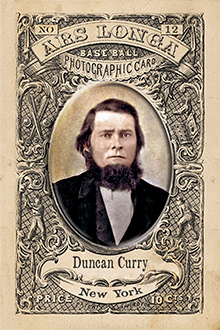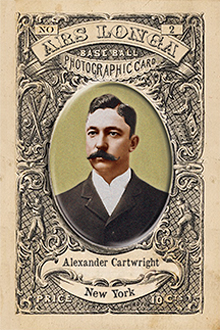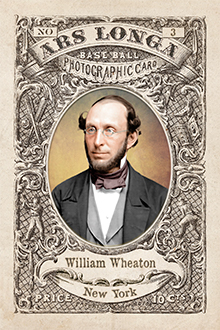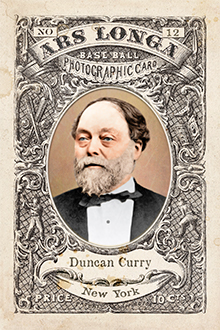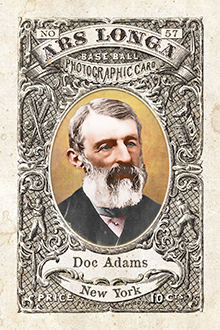
- Series: Pioneer Portraits I: 1850-1874
- City: New York
- Team: Knickerbockers
Daniel Lucius Adams (1814-1899) was playing baseball before the game was well organized or codified. He and other young doctors in New York simply found the game a great outdoor exercise. He was part of the New York Base Ball Club by 1840, five years before joining the Knickerbockers, considered by many to be the developers of the game we know today. Whatever he called it, Doc would go on to write the book on the national pastime, literally. Adams was a perennial leader among the founding fathers of the day. He advocated or arbitrated the evolving rules that came to shape the game: nine players, nine innings, ninety feet between the bases (forever to be the gold standard of human perfection). Historian John Thorn has decreed Doc as “first among the Fathers of Baseball.” The list of credentials supporting that title are too numerous to detail here. The origins of the American Game have always been curiously shrouded. The luminaries who invented the game were largely anonymous for decades. Once the Abner Doubleday myth was finally punctured, it has remained for modern historians to fill the gaps and Doc Adams has rightly assumed a prominent place in the pantheon.
- Credited with creating the shortstop position, first as a relay man when the flimsy balls made outfield throws difficult, then as a key spot in the infield defense
- In 2016, Adams' 1857 “Laws of Baseball” brought the phenomenal sum of $3.26 million at auction amid a trove of documents from that era
- Doc Adams was SABR’s Overlooked 19th Century Baseball Legend for 2014
- Doc Adams’ candidacy for election to the National Baseball Hall of Fame was finally put to vote when he appeared on the Pre-Integration Era Committee Ballot for 2016. Needing 12 of the 16 committee members’ votes for election, Doc unfortunately fell two votes short.
- Series: Pioneer Portraits I: 1850-1874
- City: New York
- Team: Knickerbockers
This is not an image of Duncan Curry. Yet again, Mark Fimoff of SABR identified my mistake and was kind enough to alert me to it.
I made and released this card twice, both in 2013.
- Series: Pioneer Portraits I: 1850-1874
- City: New York
- Team: Knickerbockers
- Hall: National Baseball Hall of Fame
This is not an image of Alexander Cartwright. Somewhere in the photographic archives of the State of Hawaii, they had tagged this photo as that of Alexander Cartwright from his time living in that great State. Again, Mark Fimoff of SABR identified my mistake and was kind enough to alert me to it.
I made and released this card twice, both in 2013.
- Series: Pioneer Portraits I: 1850-1874
- City: New York
- Team: Knickerbockers
William Wheaton (1814-1888) was an early pioneer of the new game of “base ball.” He was an officer in the Knickerbocker Club and served on its rules committee. According to his own account he may have been the first to codify rules of the game, for the Gotham Base Ball Club in 1837.
- Took time from his law practice to play the new game with business associates
- Received a federal appointment from President Grant, 1876-86
- In ‘87 bemoaned the fast pace of life compared to the days he could while away on the diamond
- John Thorn, official historian of MLB, champions Wheaton as the true “father of baseball”
- Series: Pioneer Portraits I: 1850-1874
- City: New York
- Team: Knickerbockers
Duncan Curry (1812-1894) is one of a group of illustrious founders of the Grand Old Game. Several have been put forward as the true “Father of Baseball” and Curry’s claim is as sturdy as any. A founder of the Knickerbocker Club (a requisite for paternity), Curry was an integral part of the beginnings of the game, including participation in the “first” game: in Hoboken NJ June 19, 1846.
- The NJ interlopers destroyed the Knickerbockers in that game 23-1
- Curry blamed the loss on overconfidence and an opposing pitcher with blinding speed
- In 1856 Curry’s preferred seven-inning format lost out to Louis Wadsworth’s nine, signaling the transition of the game’s growth out of the hands of the founding Knickerbockers

